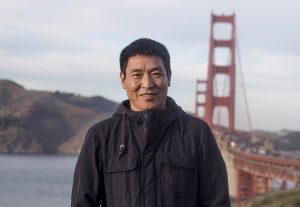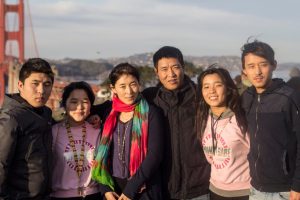
Dhondup Wangchen
Dhondup Wangchen, 43, the Tibetan filmmaker and political activist, has arrived safely in the United States to be reunited with his family on Christmas day.
Wangchen served six years in prison in Tibet for his role in the production of the documentary Leaving Fear Behind which portrayed interviews with Tibetans who described the unendurable conditions in which they were living under Chinese rule. He and his assistant Golok Jigme interviewed and filmed 108 Tibetans from aroundTibet in the lead up to the 2008 Beijing Olympics. They sent the footage out of Tibet and the film was produced and released worldwide by Zurich-based Filming for Tibet and Dhondup Wangchen’s cousin, Gyaljong Tsetrin. It was shown to foreign journalists in Beijing during the Olympics.
The film has received international awards including Committee to Protect Journalists International Press Freedom Award in 2012 and the Václav Havel International Prize for Creative Dissent in 2014.
Both Wangchen and Golok Jigme were imprisoned and suffered torture while in detention. Golok Jigme escaped from prison in 2012 and from Tibet in 2014 after living in hiding.Wangchen was released in 2014 but remained under constant surveillance, his political rights were denied and he was not allowed to travel.

Reunited with his family
He has made what has been described as an “arduous and risky escape” from Tibet and China to rejoin his wife Lhamo Tso and their four children in the United States, saying on his arrival there,“After many years, this is the first time I’m enjoying the feeling of safety and freedom […] I would like to thank everyone who made it possible for me to hold my wife and children in my arms again. However, I also feel the pain of having left behind my country, Tibet”.
During his time in prison many organisations protested against his treatment including Amnesty International, Human Rights Watch, Front Line, The Committee to Protect Journalists, Reporters without Borders and the Tibetan Centre for Human Rights and Democracy.
The Washington based International Campaign for Tibet (ICT) said that Wangchen made his film to raise international awareness of Beijing’s denial of “the fundamental rights of the Tibetan people”. Matteo Mecacci, the ICT president, said, “The six years Dhondup Wangchen had to spend in jail is a stark reminder of the human costs that China’s policies continue to have on the Tibetan people”.




 Print
Print Email
Email